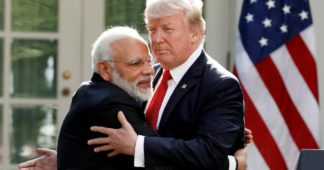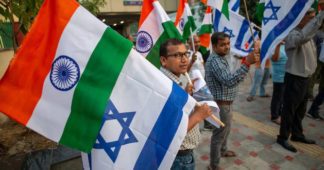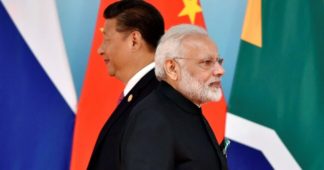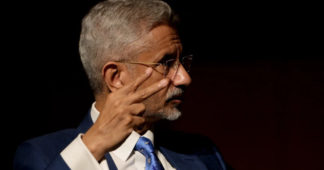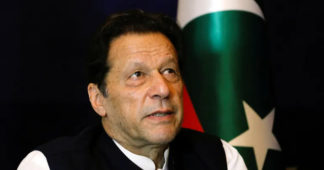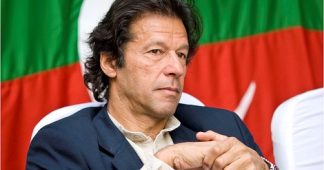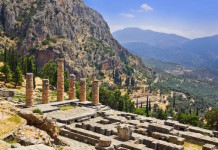The anti-war movement across the borders of the two nuclear-powered neighbors has appealed for sanity and has pushed for diplomatic engagements to resolve all outstanding issues
April 30, 2025
A week after the attacks on tourists in Pahalgam in Jammu and Kashmir (J&K) in which 26 people were killed, the media frenzy and war mongering in the region continues in full force. The governments of India and Pakistan continue to announce new measures against each other, while internally seeking to repress anti-war and critical voices.
In a latest move, Pakistan claimed on Tuesday, April 29 that its armed forces shot down an Indian surveillance drone (quadcopter) which was allegedly trying to violate the Line of Control (LOC) in Kashmir. Meanwhile, Pakistani officials claim that an attack from India is imminent.
LOC is the de facto border between Indian Kashmir and Pakistani Kashmir since the war in 1948. There were also reports of heavy exchange of fire between Indian and Pakistan armed forces across the LOC.
Meanwhile, the Indian government led by ultra-right-wing and Hindu supremacist Bharatiya Janata Party (BJP) announced that it blocked over a dozen YouTube channels belonging to major media organizations in Pakistan. It accused them of spreading “false and misleading narratives” against India and its arms forces. The banned channels include Dawn News, Geo News, and Ary News.
The Indian government already last week announced the suspension of the Indus Waters Treaty, expulsion of all Pakistani nationals, and downgrading of diplomatic relations with Pakistan.
Prime Minister Narendra Modi headed another meeting of the Cabinet Committee on Security (CCS) on Wednesday, April 30. Fresh measures against Pakistan are expected to be announced in the coming days.
Pakistani response
While strongly denying its involvement, Pakistan has claimed that the Indian government has so far failed to provide any such evidence to support its allegations of any Pakistani involvement in the attacks on April 22.
Pakistan has responded with its own diplomatic measures against India including the closing of its airspace for Indian airlines.
Claiming Indian military incursion is “imminent” Pakistan’s Defense Minister Khawaja Mohammad Asif told Reuters on Monday that his country’s forces are ready to face any such event and his country’s forces will give a “befitting reply” to any such attempt by India’s armed forces.
Pakistan has called the attempts by the Indian government to block the flow of water in the Indus river system a “weaponization of water” claiming it will continue to press for full and effective implementation of the treaty.
Pakistan’s Deputy Prime Minister and Foreign Minister Ishaq Dar said on Monday that “the water of the Indus river system is the lifeline for 240 million Pakistanis. Any attempt to manipulate or weaponize water is unacceptable and will be resisted.”
Repression in India
The Narendra Modi-led Indian government has undertaken various measures to shut down voices critical to its failures to prevent the attacks in Pahalgam and those which are opposed to its war mongering tactics and treatment of the people of J&K. It has also unleashed a fresh round of repression in Kashmir in the name of “fighting terrorism.”
Several anti-war and opposition activists have been booked for sedition after they questioned the failure of the Modi government to prevent the attacks. The activists have claimed that the war mongering tactics used by the Modi government is nothing but an attempt to divert attention from its own failures.
The Indian government has also taken action against social media channels, shutting down some and threatening action against others.
The Indian government also threatened the BBC of surveillance of its contents following its preference for calling the April 22 attackers “militants” rather than “terrorists”, preferred by India.
Repression of Kashmiri people
Meanwhile, people of Kashmir are facing even more intense scrutiny by the Indian security forces. The Indian authorities demolished several homes belonging to people allegedly linked with the attacks on April 22. The security forces have also arrested thousands of people, accused of having links with the assailants, AFP reported.
The Indian government also decided to shut 48 of 87 tourist destinations indefinitely in J&K for security purposes. The move will strongly impact the livelihood of people dependent on tourism.
Several reports have been registered of attacks on Kashmiri students across educational institutions in India, and against Muslims in general, a byproduct of the media frenzy alleging all Kashmiris and Muslims support and in some way are responsible for the April 22 attack. Reports indicate that the Modi government is not interested in curbing such violence as it allegedly furthers its electoral prospects.
Meanwhile, opposition parties in India have demanded a special session of parliament to discuss the situation. Many have been critical to the government’s efforts so far and some even accused the government of giving misleading information about the security lapses in Kashmir during an all-party meet held last week.
Sanity and peace must prevail
Several countries including China have called on the neighbors to “exercise restraint.” Guo Jiakun, spokesperson of the Chinese Ministry of Foreign Affairs told the press on Monday that both the countries should “work in the same direction, handle relevant differences properly through dialogue and consultation, and jointly uphold peace and stability in the region.”
Several others, including Iran, have offered to mediate between India and Pakistan.
Communist Party of India (Marxist) held several protests across the country to denounce the attacks and the divisive and repressive policies followed by the Modi government in India. It condemned the attacks on Kashmiri students in different parts of the country following the Pahalgam attacks and demanded the Modi government to restore rule of law in the country.
During a special session of the J&K Legislative Assembly, CPI (M) leader and MLA Yusuf Tarigami, questioned the house demolitions of those accused of being linked to the attack. He called the policy illegal and inhuman.
Several other people, including the UN special rapporteur on the right of housing, called the demolition of houses in Kashmir a repressive and illegal mechanism.
Tarigami also questioned the lack of accountability of the Modi government and its attempts to scuttle the locally elected government. All measures “related to the future of J&K must be taken with consultation with the local people,” he asserted.
Taimur Rahman, leader of the Mazdoor Kisan Party (MKP) in Pakistan issued a video message on X questioning the wisdom of war mongering between two nuclear powered nations and appealed for diplomatic engagements to resolve any outstanding matters.
Rahman also questioned the allegations leveled by the Indian government and media against Pakistan, raising the issue of lack of appropriate evidence. If there is evidence of Pakistan’s involvement, Rahman claimed, he and other anti-war individuals and groups in the region can jointly wage a movement to make the state of Pakistan accountable for such acts.
Ammar Ali Jan, leader of the Haqooq-e-Khalq Party (HKP) also questioned the motives of the Indian government calling its war mongering an “irresponsible behavior.”
We remind our readers that publication of articles on our site does not mean that we agree with what is written. Our policy is to publish anything which we consider of interest, so as to assist our readers in forming their opinions. Sometimes we even publish articles with which we totaly disagree, since we believe it is important for our readers to be informed on as wide a spectrum of views as possible.
